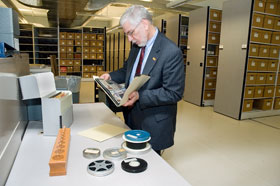  |
| HOME | THIS ISSUE | CALENDAR | GRANTS | BACK ISSUES | < BACK | NEXT > |
Montessori Society records given to Dodd Center archivesby Richard Veilleux - October 30, 2006 |
||||
|
The American Montessori Society (AMS) has chosen the Thomas J. Dodd Center as the repository for its archival material. The AMS records, documenting the history of the country's most well-known alternative educational organization, consist of printed, typescript, and handwritten materials; sound recordings; films; and photographs and slides. They reflect the professional and administrative activities of AMS, and provide historical information about the Montessori system of education. They also include information on Montessori teaching methods and materials, and the records of some local schools. Founded in Greenwich in 1960 and now headquartered in New York City, AMS is the largest Montessori organization in the world. "Joining forces with the Thomas J. Dodd Research Center, one of the nation's most important archive facilities, is a great thing for the American Montessori Society," says Richard Ungerer, executive director of AMS. "Not only do we add our rich history and educational resources to the Dodd collection, but their commitment to discovery and the human condition, such as by housing one of the largest collections of children's literature in the world and the Human Rights Institute, is right in line with all that is Montessori." The donation also includes some financial support, says Thomas Wilsted, director of the Dodd Center, and includes a provision for the AMS to add to the collection every five years. The Society was founded by educator Nancy McCormick Rambusch 46 years ago, to develop and expand the use of Montessori teaching in public and private schools across the United States. AMS's efforts to promote the philosophy and practices of Maria Montessori have since expanded to an international level. Montessori, one of Italy's first female physicians, became interested in education while caring for children in a psychiatric clinic in Rome. There she combined sensory-rich environments and hands-on experiential techniques in the hopes of reaching children previously labeled "deficient and insane."
Within two years, the children were able to pass Italy's standardized public school tests. More importantly, Montessori's innovative practices had elicited positive learning behaviors from children previously left behind by society. In 1907, Montessori continued shaping her learning model by opening "A Children's House" for pre-school children living in the slums of San Lorenzo. With her scientific background to guide her, she observed how young people learned best when engaged in purposeful activity rather than simply being fed information. She drew upon her clinical understanding of children's cognitive growth and development in constructing an educational framework that would respect individuality and fulfill the needs of the "whole child." "The collection means a lot to us," says Wilsted. "There is the Connecticut connection, with the society's founding in Greenwich; the education connection to our children's literature collection; and the connection to the Neag School of Education, one of the top education schools in the nation." Michael Young, an associate professor of educational psychology and director of the school's Learning Technology Program, says he plans to visit the collection and encourage his students to use it. "Every time I've taught EPSY 359 (Theories of Learning)," he says, "at least one student has chosen Marie Montessori as a theorist to study because of her long-term impact on early childhood education and the remarkable parallels between her work and contemporary learning theories like constructivism, constructionism, and situated learning." The collection was welcomed to the University during a reception on Oct. 28. |
| ADVANCE HOME UCONN HOME |

